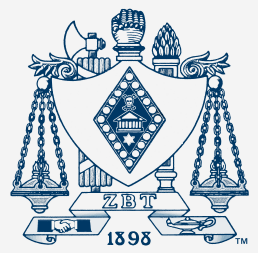Zeta Beta Tau Foundation
Chapter Campaigns
By Faron A. Lewitt — Issue: Spring 2020

Capital fundraising is not something that most ZBT house corporations or their individual officers do frequently. Yes, many of us volunteer to help with annual fundraising at our children’s schools, our churches/synagogues or other charitable groups, but major gift fundraising is a different animal.
The Zeta Beta Tau Foundation has seen a number of chapter-specific fundraising campaigns over the years. Should your chapter/house corporation be considering – or need to consider – the possibility of raising money from your chapter’s alumni to build, purchase or renovate a chapter house, or for other purposes such as need and/or merit based academic scholarships or leadership and heritage programming, we’d like to share some of the lessons learned from past ZBT chapter campaigns.
Types of Fundraising
First, we need to recognize that there are different kinds of fundraising. You may already be raising money through an annual fund, which is a great first step. Annual gifts may provide a modest income (typically $5,000 – $15,000) for house maintenance or for supporting the chapter in recruitment, purchase of initiation regalia and supplies, etc., which is certainly helpful.
The second kind of fundraising, and the focus of this information, is major gift fundraising. This is a concentrated effort to raise funds for capital projects. In the Greek world, this is typically for the building, purchase, or renovation of a chapter house. Campaigns can, however, include other types of projects; some ZBT campaigns have also included goals for endowment of academic scholarships or for leadership and heritage programs, for example.
Regardless of the specific project(s) for which capital is needed, in the Greek world campaigns typically have fundraising goals of $500,000 – $3,000,000. They require significant effort and planning, as they take place over a one- to three-year period. The Zeta Beta Tau Foundation has received individual gifts/pledges restricted to chapter projects from $10 to $1,000,000.
One mistake to avoid is the idea of “fair share” fundraising. If you need to raise $1,000,000 and have 1,000 living alumni, someone will undoubtedly suggest, “hey, let’s just ask everyone to contribute $1,000 and we’ve raised a million dollars!” That never works, for one simple reason – not all of your alumni will contribute. In fact, in the average fraternity fundraising campaign, if you get 15% of your alumni to make a gift, you are doing well; the best campaigns might reach as high as 25%.
Fundraising Consultants
After you have an idea of what you need to raise money for and how much you think you need to raise, the first decision is whether or not to engage professional campaign consultants. For an effort of about $400,000 or more, we strongly urge you to consider doing so.
Hiring a campaign consultant is not inexpensive, but there are many advantages:
- They are experienced. They have run many campaigns for many different types of non-profit organizations. You want someone who has experience in the Greek world, of course, but their exposure to many different types of non-profits means that they also bring a wide range of creative ideas from other organizations to your project.
- They are objective. As strange as this might seem to those of us involved in building brotherhood, your alumni will tell a consultant things that they would never tell each other. And as an outsider, they can provide new insights and perceptions that can motivate volunteers.
- They are often skilled content creators. There are many publications, brochures and other items that must be produced for a campaign. Your consultant will have experience in creating these items and, more particularly, in pointing out which items are most relevant and needed so that you don’t waste time on unnecessary projects.
- They can address Board giving. A top priority of the early days in your campaign is making sure that all the leadership makes a pledge. Your consultant should stress this early and can help you in reaching 100% participation by your Board before outreach begins to other alumni.
- They can help you identify a philanthropic partner. Aside from the vital work of simply raising money, there is a significant amount of work to be done to organize and manage a capital campaign. For example, the Zeta Beta Tau Foundation often works with consultants for Chapter campaigns to provide many of the administrative components of a campaign, including:
- Tax deductibility – Gifts to a local House Corporation are not tax-deductible. If you think it important to give your alumni the ability to make gifts that are tax-deductible, the Zeta Beta Tau Foundation can facilitate the creation of chapter-specific funds; gifts directed to those funds are deductible to the extent provided by law.
- Record keeping – tracking donors, prospects and gifts, and sending consistent pledge reminders to donors who have monthly, quarterly or annual pledges.
- Acknowledgement letters for tax purposes – the Foundation sends contemporaneous acknowledgment of gifts made so that the donor has written verification of his gift for tax purposes.
- Audits – the Foundation is audited annually, so donors and campaign leaders have confidence in the campaign’s financial operation.
- Legal rulings & opinions – in some cases, primarily those involving house renovation or construction, your consultant may recommend that legal counsel evaluate the project and provide a written opinion as to the percentage of the project that is educational in nature.
- Alumni data – the consultant should help you increase the accuracy of your mailing and email addresses during the campaign and should work with the ZBT International Headquarters and/or Foundation to see that these updates are made in their database.
- Fund stewardship – donors who make endowment gifts expect for their contribution to have a positive impact on their chapter in perpetuity. The Foundation’s governance structure provides financial and administrative oversight of all endowment funds to ensure that donor gifts are appropriately stewarded and are used to support the chapter as intended by the donor.
- Consistency – House Corporation volunteers often change for one reason or another. With the Zeta Beta Tau Foundation as a philanthropic partner, you have the benefit of professional management and administration in perpetuity.
- They help serve as a point of contact between the entities involved in a campaign. The right consultant should be able to “speak the language” of all the entities that might be involved in your campaign – the House Corporation, your alumni, the Zeta Beta Tau Foundation and the International Headquarters – so that everyone is kept up-to-date about important campaign decisions and activity.
As an example, Psi Chapter (Alabama) has been engaged with a firm for the last two years on a Feasibility Study and Capital Campaign. Some of the benefits they’ve seen as a result of that partnership include:
- They offer prospect research and advice on approaching certain donors. The consultant has access to research partners who provide electronic screening of the alumni database to help uncover potential major donors.
- They have experience in public speaking. It is not uncommon for the consultant to be asked to participate, with representatives of your committee, at fundraising events. While your campaign chair and committee members should be the face of the campaign, good consultants have experience in front of crowds and, when needed, can augment and support the campaign message in a way that engenders confidence.
- They keep the focus on fundraising. It’s easy to let undergraduate operations and issues, facility needs, and day-to-day tasks divert attention from the campaign. With regularly scheduled calls specifically for campaign-related discussion, the consultant keeps the committee on task.
- They improve communications with alumni. Communication is a vital part of a campaign. Consultants can help create content, can craft the Case for Support so that it resonates with alumni, and can distribute the message to your alumni (and undergraduate parents) through several different communication channels.
To be clear about expectations, though, there is one very important thing to know: consultants don’t raise the money. Some of them (though not all) are willing to accompany campaign committee members on some visits to provide support, particularly with volunteers who may be making their first such calls and could use some hand-holding as they become comfortable with the solicitation process, but the consultant is not responsible for soliciting your alumni. While the consultant can be a valuable partner in that process, your alumni want to hear from those who are responsible for implementing the vision of the campaign and who can illustrate the impact their gift will make on the project; they need to meet and trust those who will be stewarding their gift into the future – and that’s the alumni leadership.
What To Look For
It is likely that most house corporations have never hired a fundraising consulting firm. Given our experience with these campaigns, we have relationships with firms that have a track record in the Greek world (and, more specifically, with ZBT chapters), which we’re happy to pass along if you would like some suggestions. As you consider options, here are some things to look for and questions that you might ask firms:
- Who will be running our campaign? Some firms send a seasoned, senior partner in to make the sales presentation, and then a junior account manager becomes your consultant. Make sure you know, and have a chance to interview, the person with whom you’ll be working.
- Do you run campaigns with a standard template, or do you design each campaign differently? Every campaign is different. While some fundraising practices are standard, each organization is unique. One size doesn’t fit all.
- What are the fees that you will charge to run a campaign? It should always be a flat fee; charging a percentage of the income is considered unethical in the fundraising profession.
- What other expenses will we incur? Ask the consultant to itemize those expenses and include them in their written proposal. Consulting fees may appear reasonable, but they might charge administrative or management fees every time they need to make a copy or provide something that is “outside the scope of the campaign work.”
- Is there a mark-up of any kind on direct expenses? There will always be incidental campaign expenses – paper costs, printing, postage, travel, etc. Ask if the consultant adds a mark-up to any such expenses they incur.
- What is the firm’s track record of success? Ask for examples of successful feasibility studies and campaigns they’ve run. Just as important, though, is to ask for examples that didn’t go well, and ask why. If a firm suggests that they’ve never been involved in an unsuccessful feasibility study or capital campaign, be very wary.
- Why should we hire you? In other words, what is the value proposition? What is it that makes them different from other firms?
- Who owns the firm? Some companies are owned and operated by the partners in the firm, and some are owned by a private equity firm or other outside investors.
- Do they suggest conducting a Feasibility Study first, to determine the viability of the campaign, or do they contract the Feasibility Study and the Campaign together? As noted earlier, not every house corporation is ready to run a campaign. Some may think that they can raise more money than is realistic; some may believe that they wouldn’t be able to raise enough money to meet their needs. Either way, Feasibility Studies determine readiness and a realistic goal. If a consultant pushes you to engage for the study and the campaign at the same time, then they may have already prejudiced their evaluation towards running a campaign.
- What percentage of your Feasibility Studies result in a recommendation for a campaign? About 75% – 80% of the time, a Feasibility Study will recommend that the organization can successfully conduct a campaign. If a consulting firm says that all – or very close to all – of their Feasibility Studies result in campaigns, consider that a possible red flag.
- Is it important that the firm’s practice is concentrated in a certain type of fundraising, or a certain geographic location? As mentioned earlier, there is certainly great value in considering a firm that has Greek – and, more specifically, ZBT – fundraising experience. However, there are benefits in hiring a firm that has a diverse clientele, as consultants learn new or innovative fundraising techniques from organizations in other sectors that can be of benefit to you. Geographical concentration isn’t very important in Greek fundraising, as alumni are often dispersed across the country.
- Hire a consultant that you like. You could easily be working with the consultant for the next year or two – perhaps more, if it’s a very large campaign. Making sure that he/she is the right fit and has the right temperament to work with your house corporation board and campaign volunteers is important.
Feasibility Study
After defining the need for capital resources and identifying a fundraising consulting partner, the first step towards a capital campaign is evaluating whether or not your chapter has the ability to raise the needed funds. That question is answered by having your consulting partner conduct a Feasibility Study. The Feasibility Study accomplishes several things:
- It objectively assesses the capacity and willingness of your alumni to participate in a fundraising effort. If you need to raise, say, $2,000,000 to buy a house that is coming available, a Feasibility Study will answer the question “will our alumni be likely to donate that much for this project?” Very often the answer is yes; sometimes, however, the answer is no. For example, our Lambda Chapter (Case Western Reserve University) recently completed a Feasibility Study that revealed the timing was not right for them to start a campaign. While their alumni are generally successful and fully capable of supporting a large campaign, a lack of communication with alumni over the last 20+ years meant that they were uninformed and felt no connection to the chapter today; as a result, despite their ability to make gifts, they were not motivated to make gifts. The firm conducting the study made several recommendations to help re-engage alumni and suggested re-evaluating the prospect of a campaign after rebuilding relationships over a few years.
- It solicits feedback on the anticipated project(s) that you seek to support, to determine whether or notthey resonate with alumni. Charitable interests vary from person to person. One alumnus may be extremely enthusiastic about making a gift to name a room. His very best ZBT friend, however, may have no interest in bricks-and-mortar. But because a scholarship helped him get through school, he might be very interested in endowing a scholarship to help an undergraduate brother. Psi Chapter (Alabama) is a good example of this. After a successful campaign that was exclusively for a major renovation of the chapter house in 2015, they recently launched a second campaign that included 3 giving options: alumni could support some additional, minor renovation work to the house, an endowment for several new, named scholarships, or a fund to support leadership & heritage programs.
- It identifies key leaders and prospective donors. While campaign chairs or volunteers are sometimes easily identified early in the discussion, the Study asks alumni who they think would be good leaders of this effort, and who they think some of the larger contributors might be.
For inquiries regarding chapter specific fundraising including campaign feasibility studies, chapter campaigns or chapter [scholarship/leadership/heritage] funds, please contact Zeta Beta Tau Foundation Chief Executive Officer, Faron A. Lewitt at flewitt@zbtfoundation.org or at 317-506-706
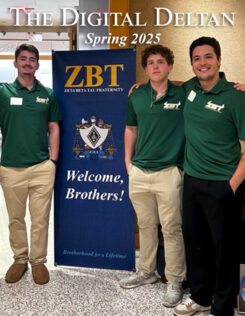 Spring 2025
Spring 2025 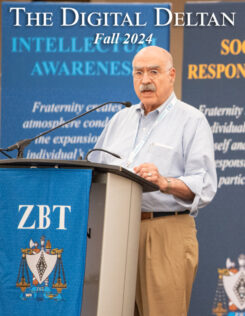 Fall 2024
Fall 2024 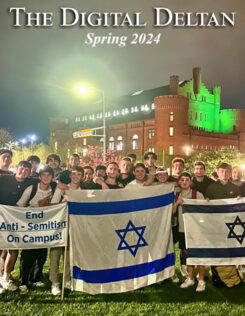 Spring 2024
Spring 2024 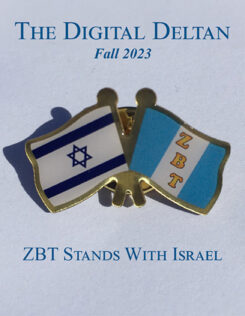 Fall 2023
Fall 2023 